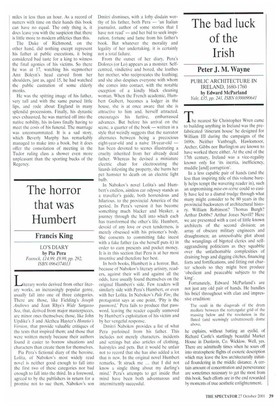The horror that was Humbert
Francis King
LO'S DIARY by Pia Pera Foxrock, £14.99, £9.99, pp. 292, ISBN 0964374013 Literary works derived from other literary works, an increasingly popular genre, usually fall into one of three categories. There are those, like Fielding's Joseph Andrews and Jean Rhys's Wide Sargasso Sea, that, derived from major masterpieces, are minor ones themselves; those, like John Updike's S and Alethea Hayter's Horatio's Version, that provide valuable critiques of the texts that inspired them; and those that were written merely because their authors found it easier to borrow situations and characters than create them for themselves.
Pia Pera's fictional diary of the heroine, Lolita, of Nabokov's most widely read novel is neither good enough to fall into the first two of these categories nor bad enough to fall into the third. In a foreword, agreed to by the publishers in return for a promise not to sue them, Nabokov's son Dmitri dismisses, with a lofty disdain worthy of his father, both Pera — 'an Italian journalist, author of some stories that I have not read' — and her bid to seek inspiration, fortune and fame from his father's book. But whatever the morality and legality of her undertaking, it is certainly not a total failure.
From the outset of her diary, Pera's Dolores (or Lo) appears as a monster. Selfcentred, vindictive and bored, she loathes her mother, who reciprocates the loathing; and she also despises everyone with whom she comes into contact, with the notable exception of a kindly black cleaning woman. When the French academic, Humbert Guibert, becomes a lodger in the house, she is at once aware that she is attractive to him and, herself attracted, encourages his furtive, embarrassed advances. But before his arrival on the scene, a quarter of the book — written in a style that weirdly suggests that the narrator alternates between being a precocious eight-year-old and a naive 18-year-old — has been devoted to scenes illustrating a cruelty inherited from her already dead father. Whereas he devised a miniature electric chair for electrocuting the lizards infesting the property, she burns her pet hamster to death on an electric light bulb.
In Nabokov's novel Lolita's and Humbert's endless, aimless car odyssey stands as a traveller's guide, both horrendous and hilarious, to the provincial America of the period. In Pera's version it has become something much blacker and bleaker, a journey through the hell into which each has transformed the other's life. Humbert, devoid of any love or even tenderness, is merely obsessed with his prisoner's body. She consents to committing fake incest with a fake father (as she herself puts it) in order to earn presents and pocket money. It is in this section that Pera is at her most inventive and therefore her best.
In both books, Humbert is a horror. But, because of Nabokov's literary artistry, readers, against their will and against all the odds, have usually found themselves on the original Humbert's side. Few readers will similarly side with Pera's Humbert, or even with her Lolita. In Nabokov's Pale Fire, the protagonist says at one point. 'Pity is the password.' Pera fails to produce that password, leaving the reader equally unmoved by Humbert's exploitation of his victim and by her vengeful response.
Dmitri Nabokov provides a list of what Pera purloined from his father. This includes not merely characters, incidents and settings but also articles of clothing, hairstyles and pets. But it would be unfair not to record that she has also added a lot that is new. In the original novel Humbert remarks, it struck me ... that I did not know a single thing about my darling's mind.' Pera's attempts to get inside that mind have been both adventurous and intermittently successful.










































































 Previous page
Previous page